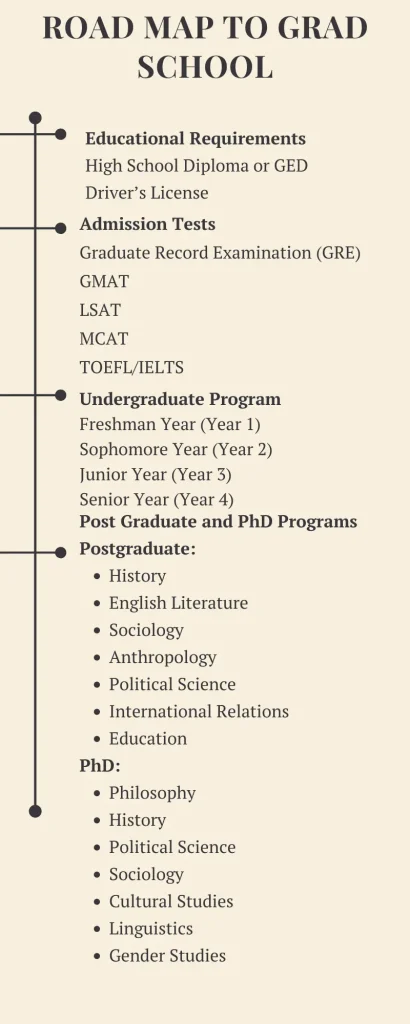How Long is Grad School
Graduate school typically ranges from 2 to 7 years, depending on the program and degree. Master’s programs usually take 2 to 3 years, while doctoral programs can extend to 5 to 7 years. Factors like research requirements, field of study, and part-time enrollment affect how long is grad school.
What is Grad School
Graduate school is an advanced program of study that follows the completion of an undergraduate degree. It offers specialized education in various fields such as business, law, medicine, engineering, and the arts. Graduate programs include master’s degrees, doctorates, and professional degrees. These programs involve rigorous coursework, research, and practical experience, preparing students for expert roles in their chosen professions or academic careers.

Graduate school focuses on developing advanced knowledge and skills, often requiring a thesis or dissertation. It emphasizes critical thinking, research methodologies, and specialized expertise. Students engage in in-depth studies, collaborative projects, and internships or clinical experiences, depending on their field. Graduate education equips individuals with the qualifications needed for higher-level positions, academic appointments, or specialized professional practice.
How Long is Grad School
When considering the duration of a graduate program, it’s important to understand the timelines associated with undergraduate and associate degree programs as well.
Undergraduate Program:
Freshman Year (Year 1)
Academic Focus:
Introduction to Core Subjects: Students typically take introductory courses in their major as well as general education requirements.
General Education Courses: These might include English, Mathematics, Science, and Social Sciences.
Electives: Opportunity to explore a variety of subjects outside the major.
Activities and Experiences:
Orientation Programs: Helps students acclimate to college life.
Clubs and Organizations: Encouraged to join to build social networks and explore interests.
Advising and Mentorship: Regular meetings with academic advisors to plan the course load and career goals.
Sophomore Year (Year 2)
Academic Focus:
Intermediate Courses: Begin to delve deeper into major-specific courses.
General Education Continuation: Complete remaining general education requirements.
Electives and Minors: Continue to explore or start a minor.
Activities and Experiences:
Internships and Part-time Jobs: Start looking for opportunities related to the field of study.
Study Abroad Planning: If interested, begin planning for studying abroad in junior year.
Leadership Roles: Take on leadership roles in clubs and organizations.
Junior Year (Year 3)
Academic Focus:
Advanced Courses: Focus on upper-level courses in the major.
Research Opportunities: Engage in research projects, if available.
Preparation for Graduate School: Begin to consider and prepare for potential graduate studies (GRE, GMAT, etc.).
Activities and Experiences:
Study Abroad: Many students choose to study abroad during this year.
Internships: Gain more substantial internship experience in the field of study.
Professional Networking: Start building a professional network through events, conferences, and alumni connections.
Senior Year (Year 4)
Academic Focus:
Capstone Projects: Complete a major capstone project or thesis.
Final Major Requirements: Finish any remaining major-specific courses.
Graduate School Applications: If applicable, complete applications for graduate school.
Activities and Experiences:
Career Services: Utilize career services for resume writing, interview preparation, and job search.
Job Applications: Start applying for jobs in the final semester.
Commencement Planning: Prepare for graduation ceremonies and post-graduation plans.

How to Enter Grad School
Entering graduate school involves meeting specific educational requirements, undergoing entry tests, and navigating the application process. Here’s an overview of the essential aspects of entering grad school:
Educational Requirements:
Specific Coursework: Some programs may require specific undergraduate courses as prerequisites. For example, a master’s in psychology might require introductory psychology courses, statistics, and research methods.
Course Completion: Applicants should ensure they have completed all required courses before applying.
Entry Tests:
Graduate Record Examination (GRE)
General Test: Many graduate programs require the GRE General Test, which assesses verbal reasoning, quantitative reasoning, and analytical writing.
Subject Tests: Some programs, especially in the sciences, may require GRE Subject Tests in specific areas such as Biology, Chemistry, or Mathematics.
Other Standardized Tests
GMAT: Required for most business and management programs (MBA).
LSAT: Required for law school admission.
MCAT: Required for medical school admission.
TOEFL/IELTS: Required for non-native English speakers to demonstrate English proficiency.
Application Process:
Transcripts
Official Transcripts: Applicants must submit official transcripts from all post-secondary institutions attended.
Academic Performance: Transcripts are reviewed for overall academic performance, course rigor, and grades in relevant courses.
Letters of Recommendation
Number Required: Typically, 2-3 letters of recommendation are required.
Sources: Letters should come from professors, research supervisors, or professional references who can speak to the applicant’s qualifications and potential for success in graduate study.
Statement of Purpose
Personal Statement: A written statement outlining the applicant’s academic and professional goals, research interests, and reasons for pursuing the specific graduate program.
Program Fit: The statement should demonstrate how the applicant’s goals align with the program’s strengths and faculty expertise.
Resume/CV
Professional Experience: A detailed resume or curriculum vitae (CV) highlighting relevant academic, research, and professional experiences.
Achievements: Include any publications, presentations, awards, and relevant skills.
Financial Aids:
Many graduate students qualify for financial aid, scholarships, or assistantships to support their studies. Employer sponsorship and tuition assistance programs are also available for working professionals pursuing graduate degrees. It’s important for prospective students to explore these financial aid options and understand the costs associated with graduate education.
Post Graduate and PhD Programs
Business and Management
Postgraduate:
- MBA (Master of Business Administration)
- Finance
- Marketing
- Human Resources
- Operations Management
- Entrepreneurship
- International Business
PhD:
- Business Administration
- Finance
- Marketing
- Organizational Behavior
- Operations Research
- Strategy and Innovation
Engineering and Technology
Postgraduate:
- Civil Engineering
- Mechanical Engineering
- Electrical Engineering
- Computer Science
- Chemical Engineering
- Biomedical Engineering
- Environmental Engineering
PhD:
- Electrical and Computer Engineering
- Materials Science and Engineering
- Aerospace Engineering
- Robotics
- Artificial Intelligence
- Nanotechnology
Health and Medical Sciences
Postgraduate:
- Nursing (MSN)
- Public Health (MPH)
- Healthcare Administration
- Clinical Psychology
- Physical Therapy
- Occupational Therapy
- Nutrition and Dietetics
PhD:
- Biomedical Sciences
- Epidemiology
- Neuroscience
- Pharmacology
- Clinical Psychology
- Health Policy and Management
Humanities and Social Sciences
Postgraduate:
- History
- English Literature
- Sociology
- Anthropology
- Political Science
- International Relations
- Education
PhD:
- Philosophy
- History
- Political Science
- Sociology
- Cultural Studies
- Linguistics
- Gender Studies
Natural Sciences
Postgraduate:
- Biology
- Chemistry
- Physics
- Environmental Science
- Geology
- Marine Biology
PhD:
- Molecular Biology
- Organic Chemistry
- Theoretical Physics
- Environmental Toxicology
- Astronomy
- Geophysics
Law and Legal Studies
Postgraduate:
- JD (Juris Doctor)
- LLM (Master of Laws)
- International Law
- Corporate Law
- Human Rights Law
- Environmental Law
PhD:
- Doctor of Juridical Science (SJD)
- Comparative Law
- Legal History
- Law and Economics
- Public Law
Arts and Creative Fields
Postgraduate:
- Fine Arts (MFA)
- Graphic Design
- Film Production
- Creative Writing
- Music Performance
- Theater Arts
PhD:
- Art History
- Musicology
- Theater Studies
- Creative Writing
- Film Studies
- Design Research
Education
Postgraduate:
- Curriculum and Instruction
- Educational Leadership
- Special Education
- Counseling and Guidance
- Higher Education Administration
PhD:
- Educational Psychology
- Curriculum and Instruction
- Educational Policy and Leadership
- Special Education
- Comparative Education
Top 10 Grad Schools

Harvard University
Location: Cambridge, Massachusetts
Notable Programs: Business (Harvard Business School), Law (Harvard Law School), Medicine (Harvard Medical School), Education (Harvard Graduate School of Education)
Stanford University
Location: Stanford, California
Notable Programs: Business (Stanford Graduate School of Business), Engineering, Law (Stanford Law School), Education
Massachusetts Institute of Technology (MIT)
Location: Cambridge, Massachusetts
Notable Programs: Engineering, Computer Science, Economics, Business (Sloan School of Management)
University of California, Berkeley (UC Berkeley)
Location: Berkeley, California
Notable Programs: Engineering, Business (Haas School of Business), Law (Berkeley Law), Environmental Sciences
University of Chicago
Location: Chicago, Illinois
Notable Programs: Business (Booth School of Business), Law (University of Chicago Law School), Economics, Political Science
California Institute of Technology (Caltech)
Location: Pasadena, California
Notable Programs: Engineering, Physics, Chemistry, Computer Science
Princeton University
Location: Princeton, New Jersey
Notable Programs: Public and International Affairs (Woodrow Wilson School), Economics, History, Political Science
Columbia University
Location: New York, New York
Notable Programs: Business (Columbia Business School), Law (Columbia Law School), Journalism, International Affairs
University of Pennsylvania
Location: Philadelphia, Pennsylvania
Notable Programs: Business (Wharton School), Law (Penn Law), Medicine (Perelman School of Medicine), Education
Yale University
Location: New Haven, Connecticut
Notable Programs: Law (Yale Law School), Business (Yale School of Management), Medicine, Environmental Studies
Factors Affecting the Length of Grad School
Factors that can affect the length of grad school include:
Program Structure: The specific requirements and structure of the program, such as research components, internships, or thesis/dissertation work, can influence the duration of the program.
Full-Time vs. Part-Time Enrollment: Part-time enrollment typically extends the duration of the program compared to full-time enrollment.
Research and Writing: Programs involving extensive research and writing, such as dissertations or theses, can contribute to a longer duration.
Specializations and Concentrations: Specialized fields of study or concentrations within a program may require additional coursework, leading to a longer program length.
Funding and Work Commitments: Balancing work commitments or seeking funding opportunities, such as teaching or research assistantships, can impact the pace of completing the program.
Final Verdict
In conclusion, the length of grad school depends on various factors, including the type of program, enrollment status, and specific program requirements. Understanding these factors is essential for prospective students to plan effectively and make informed decisions about pursuing advanced degrees in their chosen fields.
FAQs
1. How long does it take to complete a master’s degree in grad school?
The duration of a master’s degree program in grad school typically ranges from 1.5 to 2 years, depending on the specific program and field of study.
2. What is the average duration of a Ph.D. program in grad school?
On average, completing a Ph.D. program in grad school takes approximately 5 to 7 years, considering the research, dissertation, and other program requirements.
3. Do part-time enrollments affect the duration of grad school programs?
Yes, part-time enrollments generally extend the duration of grad school programs due to reduced course load per semester or quarter.
4. How do specializations and concentrations impact the length of grad school?
Specialized fields of study or concentrations may require additional coursework, potentially extending the length of grad school programs.
5. What funding opportunities can help in managing the duration of grad school?
Seeking funding opportunities, such as teaching or research assistantships, can assist in managing the financial aspects and potentially influencing the pace of completing a grad school program.
